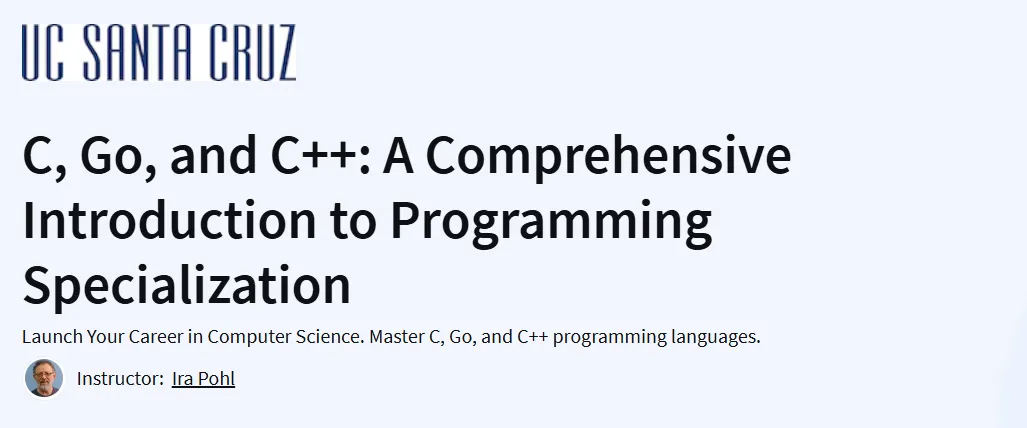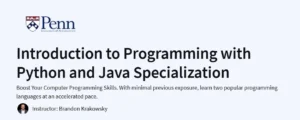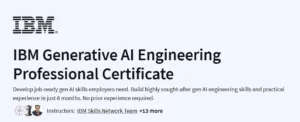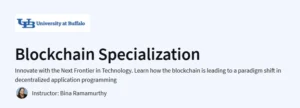What will you learn in this C, Go, and C++: A Comprehensive Introduction to Programming Specialization Course
Foundational Programming Concepts: Begin with the basics of programming in C, understanding syntax, control structures, and data types.
Advanced Language Features: Progress to learning Go and C++, focusing on advanced features such as object-oriented programming, memory management, and concurrency.
Algorithmic Thinking: Develop the ability to describe, analyze, and implement algorithms, enhancing problem-solving skills.
Hands-On Coding Experience: Engage in practical exercises and projects that reinforce learning through real-world application.
Program Overview
1. C for Everyone: Programming Fundamentals
⏳ 15 hours
Write simple programs in C.
Understand arrays, pointers, functions, and storage classes.
Learn about logic operators, lexical elements, and data types.
2. C for Everyone: Structured Programming
⏳ 15 hours
Dive deeper into structured programming concepts.
Implement more complex programs using C.
Explore data structures and memory management.
3. Go for Everyone: Programming Fundamentals
⏳ 15 hours
Introduction to Go programming language.
Understand Go’s syntax and control structures.
Implement basic programs and functions in Go.
4. Go for Everyone: Functions, Methods, and Interfaces
⏳ 15 hours
Explore advanced features in Go, including methods and interfaces.
Understand Go’s approach to object-oriented programming.
Implement concurrent programs using Go’s goroutines.
5. C++ For C Programmers, Part A
⏳ 15 hours
Transition from C to C++ programming.
Understand object-oriented programming concepts.
Implement classes, constructors, and algorithms in C++.
6. C++ For C Programmers, Part B
⏳ 15 hours
Delve into advanced C++ topics.
Explore the Standard Template Library (STL).
Implement complex data structures and algorithms.
Get certificate
Job Outlook
Specification: C, Go, and C++: A Comprehensive Introduction to Programming Specialization Course
|
FAQs
- C builds the foundation of programming and systems thinking.
- C++ adds object-oriented programming and advanced abstractions.
- Go introduces modern concurrency and simplicity for large systems.
- Together, they cover both legacy and modern software practices.
- Mastering all three makes learners versatile across industries.
- C remains vital in embedded systems and operating systems.
- C++ dominates game development, finance, and performance-critical apps.
- Go is popular in cloud computing, DevOps, and scalable backend services.
- Each language opens doors to different career paths.
- Knowing all three boosts adaptability across tech sectors.
- Go has a simpler syntax designed for beginners.
- C requires understanding low-level concepts like memory management.
- C++ adds complexity with templates and advanced features.
- Starting with Go can build confidence before tackling harder concepts.
- Learning C and C++ afterward provides deeper control and flexibility.
- Yes, C and C++ can build modern applications.
- They are widely used in games, databases, and high-performance software.
- However, Go is more efficient for cloud-native and scalable apps.
- C/C++ often require longer development cycles compared to Go.
- Combining them gives a balance of performance and simplicity.
- Simple system utilities using C (file handlers, calculators).
- Small object-oriented applications in C++.
- Game prototypes or graphical apps with C++ libraries.
- Concurrent web servers or APIs using Go.
- Hybrid projects combining performance (C/C++) with scalability (Go).





